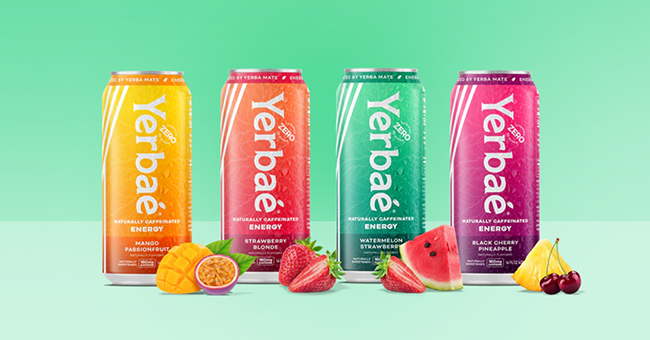Yerbaé is set to become the latest beverage company to go public as the plant-based energy brand announced today that it has completed a reverse triangular merger in order to begin trading on the Toronto Stock Exchange.
According to a press release, the Arizona-based brand, incorporated as Yerbaé Brands Corp., is expected to begin trading shares under the ticker symbol YERB.U as early as this week and upon closing of the agreement has issued over 54.4 million common shares, with around 1 million options and 4.2 million warrants outstanding.
The valuation of the company was not disclosed.
Founded in 2017 by husband and wife team Todd and Karrie Gibson, the company’s CEO and COO respectively, Yerbaé produces a line of canned sparkling waters made with caffeine from yerba mate. According to Todd Gibson, the company reported sales up 55% year-over-year over the last six months of 2022.
Speaking with BevNET, Gibson said the company had initially been pitched by an investor on taking the company public in 2020, around the time Yerbaé was raising capital through equity crowdfunding platform StartEngine. However, he began seriously exploring the potential of becoming public last year and ultimately decided to do so through the Toronto Stock Exchange via a reverse merger with Canadian online customer acquisition software company Kona Bay Technologies and its subsidiary 1362293 B.C. Ltd. (aka FinCo).
One primary benefit of going public, Gibson said, is the ability to raise capital on a more consistent basis, which he believes could help it demonstrate the business’s stability and deepen its relationship with retail partners.
“Retailers see VCs come and go, PEs come and go, out of different brands, and some of them do an incredible job and others make the investment and walk away from the brand, and when the brand runs out of cash a lot of times the retailers are left holding the bag from taking risks on emerging brands,” Gibson said. “As a public company, this gives us a different form of currency we get to work with that allows us flexibility and the opportunity to raise capital, maybe even more efficiently than as a private company.”
Although many of the food and beverage companies that issued IPOs over the past two years have faced increased scrutiny and struggled to match high valuations, Gibson said he’s optimistic that a slowdown in market activity will allow Yerbaé to stand out more among publicly traded brands.
“In our particular case, this gives us a great opportunity to shine a spotlight on this deserving brand that’s growing so rapidly,” he said.
As part of the reverse merger, Gibson has been named chairman of the board of directors while Karrie Gibson and Yerbaé CFO William Finn and VP of sales Seth Smith have also been named directors.
Other new directors joining the board, Gibson said, include former Coca-Cola VP of regional sales and marketing Carl Sweat, Imbibe flavor house partner Andy Dratt, and corporate financial professional Rose Zanic, who was previously a board member for Kona Bay Technologies. Existing investor, brand ambassador and CrossFit Games champion Annie Thorisdotter has also joined Yerbaé’s board advisory group, Gibson added.
According to Gibson, Yerbaé has focused on expanding distribution over the last year by moving to a hybrid distribution model including DSD in “key strategic markets,” broadline and direct delivery systems. Last year, the brand expanded into new retail partners including club accounts like Costco and BJ’s, while increasing volume in retail partners such as Sprouts. As well, the brand’s ecommerce sales increased 47% in 2022 and it reported a five-year CAGR of 49%.
The move also comes as the yerba mate category continues to expand. Last month, Guayaki reported it had raised $75 million in an SEC filing. Gibson said he is “bullish” on the category and will continue to position Yerbaé as a plant-based energy drink.
“We’re doing more volume than we ever have,” he said. “We’re putting more cans in the consumers hands than we ever have in company history. And we produced more product from December 1 all the way through January 31 of this month, than we did in the prior 11 months combined.”
